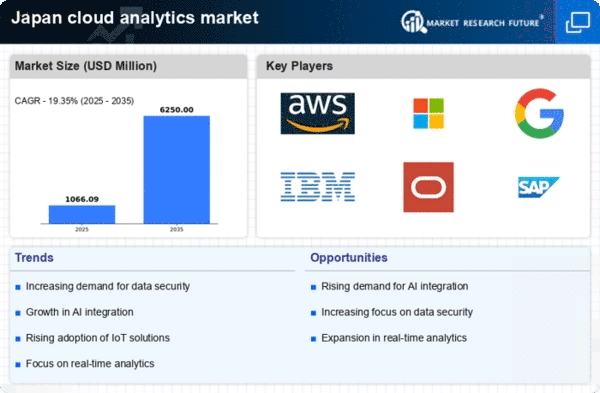Expansion of Cloud Infrastructure
The expansion of cloud infrastructure in Japan significantly impacts the cloud analytics market. With major cloud service providers investing heavily in local data centers, the availability and reliability of cloud services are improving. This infrastructure development facilitates the adoption of cloud analytics solutions across various sectors, including finance, healthcare, and retail. As of November 2025, the cloud services market in Japan is estimated to reach approximately $20 billion, with a substantial portion attributed to analytics services. Enhanced connectivity and reduced latency are likely to drive further adoption, allowing businesses to utilize cloud analytics for more efficient data processing and storage solutions.
Increased Focus on Customer Experience
In the competitive landscape of Japan, businesses are placing a heightened emphasis on customer experience, which in turn drives the growth of the cloud analytics market. Organizations are utilizing cloud analytics to gather and analyze customer data, enabling them to tailor their offerings and improve service delivery. This trend is particularly evident in the retail and e-commerce sectors, where personalized marketing strategies are becoming essential. By leveraging cloud analytics, companies can gain insights into customer behavior and preferences, leading to enhanced customer satisfaction and loyalty. As a result, the cloud analytics market is expected to see continued growth as businesses prioritize customer-centric approaches.
Regulatory Compliance and Data Governance
The cloud analytics market in Japan is influenced by the increasing need for regulatory compliance and robust data governance frameworks. As data privacy regulations become more stringent, organizations are compelled to adopt cloud analytics solutions that ensure compliance with local laws. This trend is particularly relevant in sectors such as finance and healthcare, where data handling practices are closely scrutinized. Companies are investing in cloud analytics tools that not only provide insights but also facilitate compliance with regulations such as the Personal Information Protection Act (PIPA). This focus on governance is likely to drive demand for cloud analytics solutions that offer enhanced security and compliance features.
Emergence of Advanced Analytics Technologies
The emergence of advanced analytics technologies is reshaping the cloud analytics market in Japan. Innovations such as predictive analytics, natural language processing, and machine learning are becoming increasingly integrated into cloud analytics solutions. These technologies enable organizations to derive deeper insights from their data, facilitating proactive decision-making. As businesses seek to leverage these advanced capabilities, the cloud analytics market is expected to expand significantly. The integration of AI-driven analytics tools is likely to enhance the ability of organizations to forecast trends and optimize operations, thereby driving further investment in cloud analytics solutions.
Rising Demand for Data-Driven Decision Making
The cloud analytics market in Japan is experiencing a notable surge in demand. Organizations increasingly recognize the value of data-driven decision making. Companies are leveraging cloud analytics to gain insights from vast amounts of data, which enhances operational efficiency and strategic planning. According to recent estimates, the market is projected to grow at a CAGR of approximately 15% over the next five years. This growth is fueled by the need for businesses to remain competitive in a rapidly evolving landscape. As organizations seek to harness the power of data, the cloud analytics market becomes a critical component in their digital transformation strategies, enabling them to make informed decisions based on real-time data analysis.
















